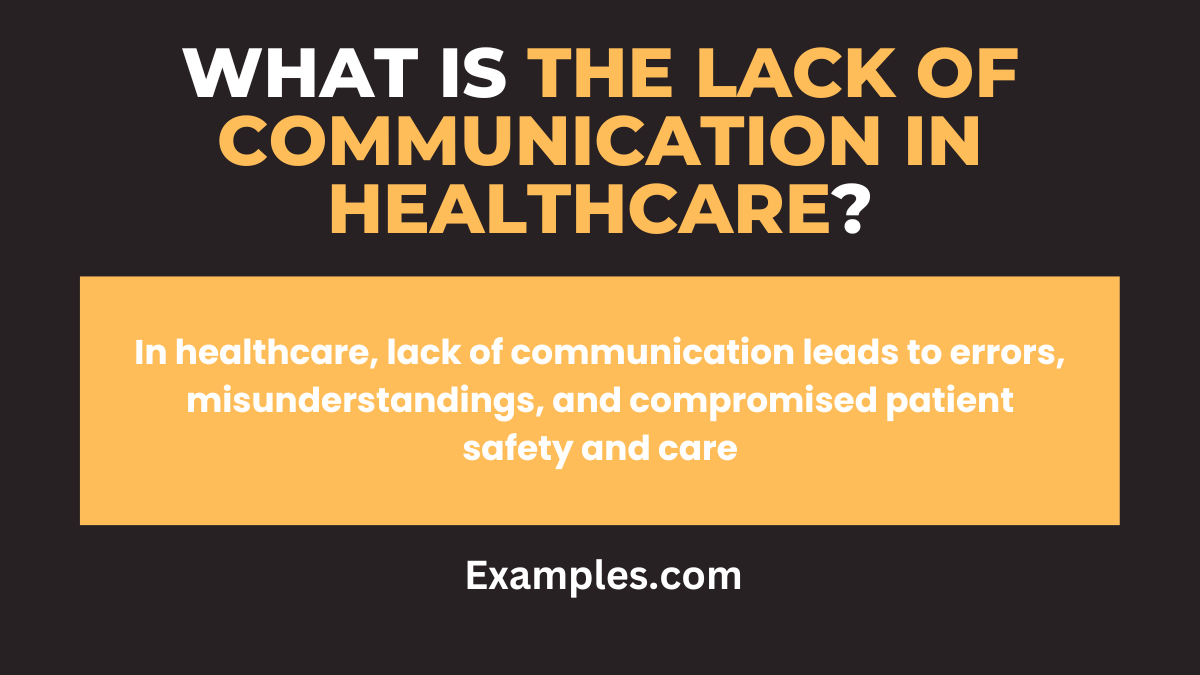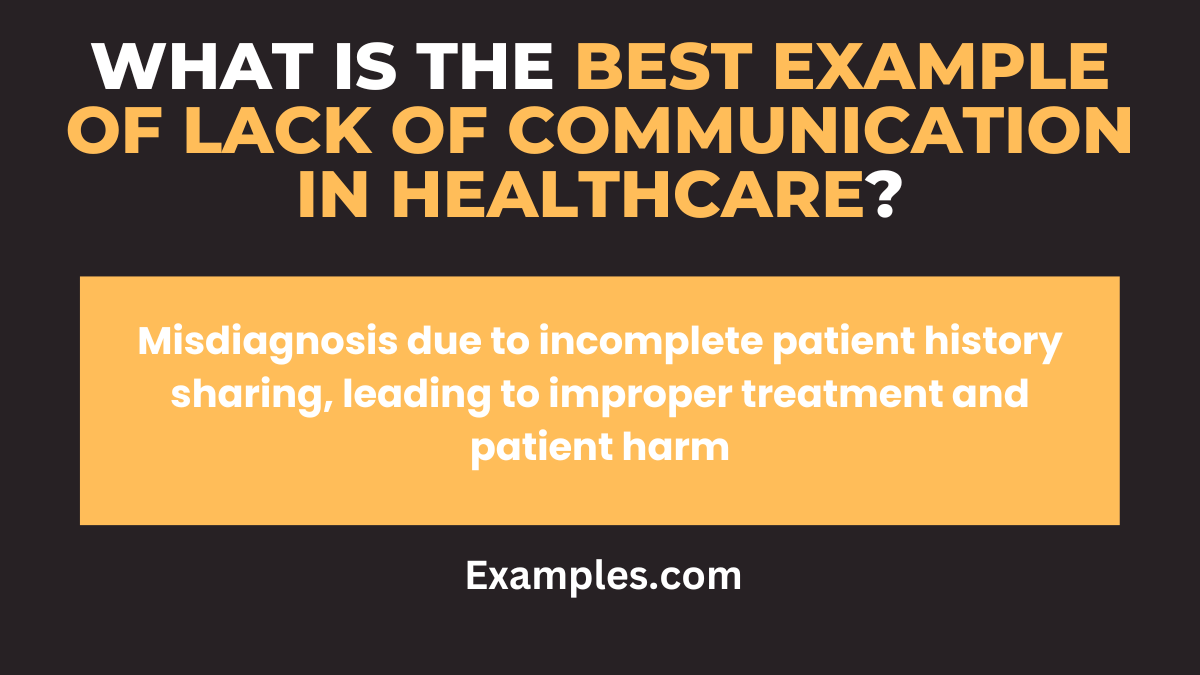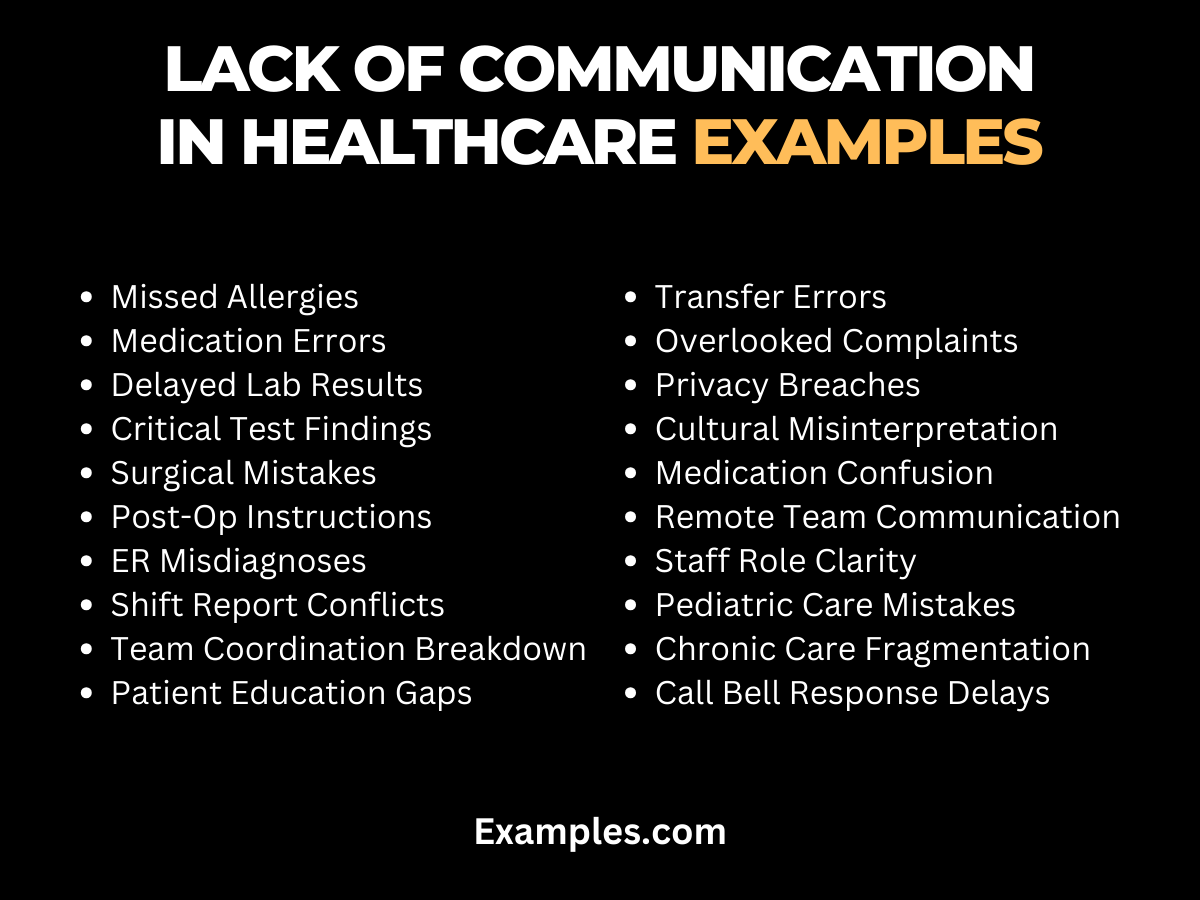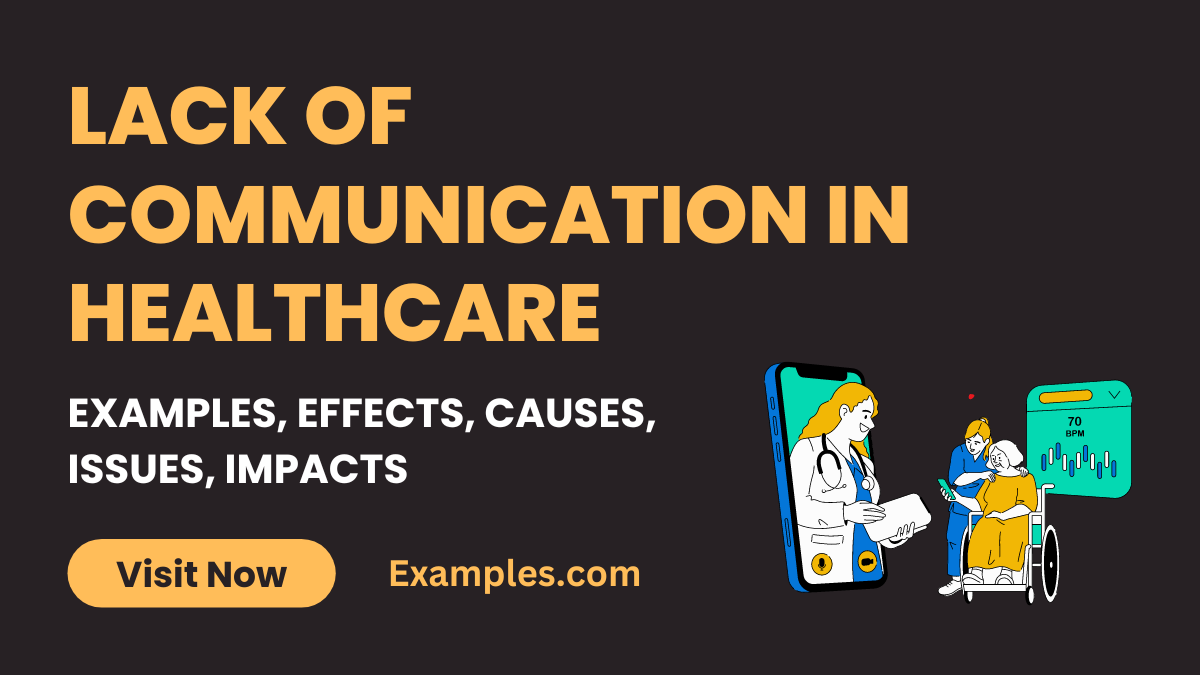19+ Lack of Communication in Healthcare Examples
This comprehensive guide delves into the often-overlooked issue of Lack of Communication in Healthcare. Through detailed communication examples, we explore how communication breakdowns can lead to serious repercussions in patient care and healthcare operations. From misinterpretations in medical information to coordination challenges within healthcare teams, this guide sheds light on the various facets of this critical issue. Understanding and addressing these communication barriers is key to improving patient outcomes and healthcare efficiency.
Download Lack of Communication in Healthcare PDF
What is the Lack of Communication in Healthcare?

Lack of Communication in Healthcare refers to the failure in effectively exchanging information among healthcare providers, and between providers and patients. This can lead to misdiagnoses, medication errors, and overall compromised patient care.
What is the Best Example of Lack of Communication in Healthcare?

A prime example of lack of communication in healthcare is the misinterpretation of a patient’s symptoms due to insufficient information exchange between specialists. For instance, vital information about a patient’s allergies not being communicated to the surgery team.
20 Lack of Communication in Healthcare Examples

In the healthcare sector, effective communication is crucial for ensuring patient safety, providing quality care, and maintaining efficient operations.Lack of Communication Examples in Healthcare professionals leads to disjointed care and inefficient teamwork. Miscommunication can result in errors in patient care, including incorrect treatments and missed diagnoses. Inconsistencies in patient information shared among teams are common, leading to fragmented care. Delays in treatment due to communication breakdowns can have dire consequences for patients. Additionally, continuous communication challenges erode team morale and cohesion.
These examples emphasize the importance of addressing healthcare miscommunication consequences, overcoming patient care communication barriers, and rectifying medical information misinterpretation. Lack of Communication Causes & Reasons with Diverse teams, high workloads, and complex systems contribute to miscommunication in healthcare. From ineffective healthcare team coordination to hospital communication challenges, each example showcases a distinct aspect of communication breakdowns and offers insights into how these issues can be resolved.
- Missed Allergies in Patient Records: Caused by incomplete patient history recording.
Example: Implement thorough checklists for patient information intake. - Incorrect Medication Administration: Due to misread prescriptions.
Example: Utilize electronic prescribing systems to reduce errors. - Delayed Lab Results Communication: Resulting from inefficient information systems.
Example: Integrate a centralized, real-time lab reporting system. - Failure to Communicate Critical Test Findings: Caused by disjointed communication channels. Example: Establish direct communication protocols between labs and physicians.
- Surgical Errors from Miscommunication: Due to unclear pre-operative planning.
Example: Conduct comprehensive pre-surgery briefings with all involved staff. - Post-Operative Care Instructions Misunderstood: Resulting from rushed discharge processes. Example: Provide written and verbal instructions, ensuring patient understanding.
- Emergency Room Misdiagnoses: Due to hurried patient assessments.
Example: Implement structured communication frameworks for patient evaluations. - Conflicting Nursing Shift Reports: Caused by inconsistent handover procedures.
Example: Standardize shift change reports with checklist-based handovers. - Breakdown in Multidisciplinary Team Coordination: Due to lack of regular team meetings.
Example: Schedule routine interdisciplinary case discussions. - Inadequate Patient Education on Treatment Plans: Caused by time constraints.
Example: Use patient education materials and follow-up consultations. - Errors in Patient Transfer Between Departments: Due to miscommunication.
Example: Utilize standardized transfer protocols and double-check procedures. - Overlooked Patient Complaints and Symptoms: Resulting from ineffective patient-provider communication.
Example: Train staff in active listening and patient engagement. - Privacy Breaches in Patient Information: Due to casual conversations.
Example: Enforce strict confidentiality protocols and regular staff training. - Misinterpretation of Cultural and Language Differences: Caused by lack of diversity training. Example: Provide language services and cultural competence education.
- Confusion Over Medication Changes: Due to unclear explanations.
Example: Clarify medication changes verbally and with written instructions. - Ineffective Communication with Remote Care Teams: Resulting from reliance on asynchronous communication.
Example: Use real-time communication tools for remote teams. - Unclear Roles and Responsibilities Among Staff: Leading to task duplication or omission.
Example: Clearly define roles and responsibilities in team meetings. - Mistakes in Pediatric Care from Parent Miscommunication: Due to assumptions about parental understanding.
Example: Verify comprehension and provide child-friendly explanations. - Fragmented Care for Chronic Conditions: Resulting from lack of coordination among specialists. Example: Implement a care coordinator role to oversee comprehensive care.
- Delayed Response to Patient Call Bells: Caused by communication gaps in staff responsibilities. Example: Use a systematic approach to monitor and respond to call bells.
Lack of Communication in Healthcare Statistics
The statistics highlighting the lack of communication in healthcare are alarming. High misdiagnosis rates, with a significant portion attributed to communication failures, underscore the issue’s severity. Medication errors, largely due to miscommunication, pose serious risks. Poor teamwork between healthcare professionals affects patient care quality, similar to how lack of communication in marriage undermines Lack of Communication in a Relationship health .Patient readmission rates and extended hospital stays often result from inadequate communication. The financial burden on healthcare systems due to these communication gaps is substantial, emphasizing the need for improved communication protocols.
- High Rates of Misdiagnoses: Miscommunication contributes to a significant percentage of misdiagnoses.
- Medication Errors Statistics: A notable number of medication errors are due to communication gaps.
- Patient Readmission Rates: Poor communication is a leading factor in patient readmissions.
- Impact on Patient Length of Stay: Ineffective communication often results in prolonged hospital stays.
- Financial Costs to Healthcare Systems: Communication failures impose substantial costs on healthcare systems.
Impacts of Lack of Communication in Healthcare
The impacts of lack of communication in healthcare are far-reaching and detrimental. Miscommunication jeopardizes patient safety, leading to increased medical errors. This results in patient dissatisfaction and erodes trust in healthcare systems. Healthcare teams face disruption in their workflow and efficiency, compounding stress and burnout. Additionally, miscommunication opens healthcare providers to legal and ethical dilemmas, further complicating the care process.
- Compromised Patient Safety: Miscommunication can lead to critical patient safety issues.
- Increased Medical Errors: A major cause of medical errors is poor communication.
- Patient Dissatisfaction: Leads to a decline in patient trust and satisfaction.
- Healthcare Team Inefficiency: Disrupts the workflow and efficiency of healthcare teams.
- Legal and Ethical Implications: Opens the door to legal issues and ethical dilemmas.
Lack of Communication in Healthcare at Workplace
In the healthcare workplace, lack of communication creates significant challenges. It hampers effective team collaboration and coordination, essential for patient care. Staff stress and burnout are exacerbated due to continuous communication barriers. Inconsistent patient care instructions and mismanagement of patient data are common, posing risks to patient safety. This communication gap also acts as a barrier to adopting innovative healthcare practices and technologies.
- Team Collaboration Challenges: Hinders effective teamwork and care coordination.
- Stress and Burnout among Staff: Poor communication contributes to increased staff stress.
- Inconsistent Patient Care Instructions: Results in inconsistent and sometimes contradictory care instructions.
- Mismanagement of Patient Data: Can lead to critical errors in managing patient records.
- Barrier to Healthcare Innovation: Slows down the adoption of new practices and technologies.
Lack of Communication Issues in Healthcare
Lack of communication in healthcare leads to critical issues. Oversights in patient history, often due to communication failures, can impact patient care. Delays in diagnosis and treatment, stemming from miscommunication, can have serious consequences. Patients often receive inadequate post-discharge instructions, leading to confusion and potential health risks. These communication gaps also strain the doctor-patient relationship and cause conflicts within healthcare teams.
- Patient History Oversights: Missing or incomplete patient history due to communication failures.
- Delayed Diagnosis and Treatment: Delays in diagnosis and treatment stemming from miscommunication.
- Inadequate Post-Discharge Instructions: Patients receive unclear or insufficient post-discharge instructions.
- Breakdown in Doctor-Patient Relationship: Erodes the trust and rapport between doctors and patients.
- Conflicts within Healthcare Teams: Leads to interpersonal conflicts and team disharmony.
What are the Effects of Lack of Communication in Healthcare?
The effects of lack of communication in healthcare are profound and concerning. Patient safety is put at risk, leading to serious incidents like medication errors and incorrect treatments. Healthcare costs escalate due to inefficiencies and errors caused by poor communication. Patient satisfaction declines when communication is lacking, affecting their overall healthcare experience. Healthcare professionals face increased stress and burnout, and the risk of legal and ethical complications rises.
- Patient Safety Risks: Miscommunication can lead to serious safety risks for patients, including medication errors and incorrect treatments.
- Increased Healthcare Costs: Inefficiencies and errors due to poor communication result in higher healthcare costs and resource wastage.
- Reduced Patient Satisfaction: Patients feel less satisfied with their care when communication is inadequate, impacting their overall experience.
- Staff Stress and Burnout: Continuous communication challenges contribute to higher stress levels and burnout among healthcare professionals.
- Legal and Ethical Complications: Miscommunication in healthcare settings can lead to legal disputes and ethical issues, harming the healthcare facility’s reputation.
What are the Causes of Lack of Communication in Healthcare?
The causes of lack of communication in healthcare are diverse. Complex healthcare systems often hinder clear and consistent communication. Diverse and multidisciplinary teams can struggle with misunderstandings and information silos. High workloads and time constraints limit opportunities for thorough communication. Many healthcare professionals lack adequate training in communication skills, and technological barriers further impede the flow of information.
- Complex Healthcare Systems: The complexity of healthcare systems makes it challenging to maintain clear and consistent communication.
- Diverse and Multidisciplinary Teams: Varied backgrounds and specializations can lead to misunderstandings and information silos.
- High Workload and Time Constraints: The demanding nature of healthcare work often leaves limited time for thorough communication.
- Inadequate Training in Communication Skills: Healthcare professionals may lack training in effective communication techniques.
- Technological Barriers: Inconsistent use or lack of access to communication technologies can hinder information flow.
Lack of Communication between Healthcare Professionals
Lack of communication between healthcare professionals leads to disjointed care and inefficient teamwork. Miscommunication can result in errors in patient care, including incorrect treatments and missed diagnoses. Inconsistencies in patient information shared among teams are common, leading to fragmented care. Delays in treatment due to communication breakdowns can have dire consequences for patients. Additionally, continuous communication challenges erode team morale and cohesion.
- Impaired Team Collaboration: Poor communication leads to disjointed efforts and inefficient teamwork among healthcare providers.
- Errors in Patient Care: Miscommunication between professionals can result in errors in administering patient care.
- Inconsistent Patient Information: Inadequate communication causes inconsistencies in the patient information shared among healthcare teams.
- Delays in Treatment: Critical delays in diagnosis and treatment often stem from communication breakdowns between professionals.
- Reduced Morale and Team Cohesion: Persistent communication issues can erode team morale and cohesion, affecting the workplace environment.
How Can Communication be Improved in Healthcare?
Improving communication in healthcare involves training staff in effective communication skills, implementing standardized communication protocols, utilizing electronic health records efficiently, and encouraging a culture of open, multidisciplinary dialogue.
What Happens When There is a Lack of Communication in Healthcare?
Lack of communication in healthcare leads to increased medical errors, compromised patient safety, delayed treatments, patient dissatisfaction, and stressed healthcare staff, ultimately affecting the overall quality of care.
What are Some Communication Barriers in Healthcare?
Communication barriers in healthcare include language differences, cultural variances, medical jargon, hierarchical structures, time constraints, and lack of adequate training in communication skills.
Lack of communication in healthcare is a pervasive issue with far-reaching consequences. It affects patient safety, healthcare efficiency, and staff well-being. Addressing this challenge through improved training, protocols, and a culture of open communication is crucial for enhancing the quality of care and patient outcomes in the healthcare sector.



